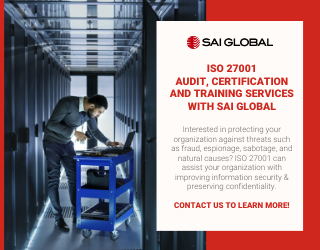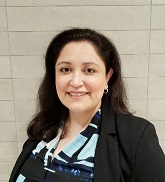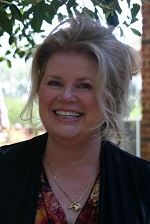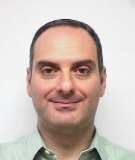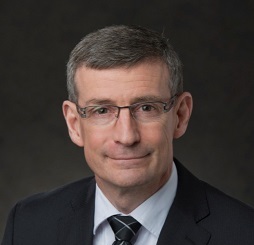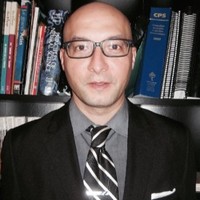|
Section 0401 |
|
|
March 2020 (Volume 70 - Issue 3) |
|
Our objective: To increase awareness, interest, and involvement in section activities and quality-related subjects. Visit our LinkedIn group at https://www.linkedin.com/groups/90170/ |
1. Next Event
Date Wednesday, March 25, 2020 Time 6:00 PM Place WOMEN
IN QUALITY INTERNATIONAL PANEL EVENT Come and join us on March 25th for an international panel discussion and networking event entitled "Women in Quality"
|
2. Ad / Publicité
|
||||||||||||||||||||
|
ABOUT THE EVENT ABOUT THE PANELISTS
*****************************************
COST
$45 for all particpants. Free for ASQ members attending their first event. NOTE: This event will also be available via Webinar, for those who cannot attend in person. FREE PARKING!! Dinner will be served at 6:00pm. Arrive early for the food and to network with fellow Quality professionals. Attendees to this event will will receive 0.5 RUs. Bring your business cards and be ready to network REGISTER EARLY FOR THIS EVENT!!
SPACE WILL BE LIMITED!! To register for this event, please send an e-mail confirming your presence to:
event@asqmontreal.qc.ca
**PLEASE INDICATE IN YOUR E-MAIL WHETHER YOU WILL BE ATTENDING IN-PERSON OR ONLINE.** **IF YOU WILL BE ATTENDING ONLINE, YOU WILL RECEIVE LOGIN DETAILS PRIOR TO THE EVENT.** 3. Upcoming ASQ Section 401 Events
Here is a list of events we have planned for April and May 2020:
April 29, 2020: Food Fraud What is Food Fraud? Food fraud is the deliberate misrepresentation or modification/adulteration or substitution of a food ingredient or product for profit and without declaring the actions to the consumer. Food fraud can also be disagreements and differing interpretations of how to legally present a food type or origin.
Food fraud can happen at many levels and in all businesses that work with food from the farmer/fisherman to ingredient manufacturers, producers, retailers, restaurants and caterers. Of course, in the end the consumer is always affected. Sometimes, it is only a loss of value and sometimes there are health risks involved. Our speaker will present some examples of food fraud with different motives, from different areas of the food world and that affect consumers in different ways. Food fraud is not new. There are documented examples, even from antiquity, but with the increase in the amount of food being produced outside of the home, the temptation, the profits and the examples increase. 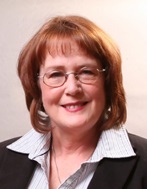 Our speaker for our April Event will be Deborah Esplin. She is a food safety and quality contract auditor with SAI Global with sixteen years experience in food production and auditing. For thirteen years she worked in nut and granola processing, snack, fruit and trail mixes, dry ingredients, wheat-based and gluten-free bakery products, packing of drink mix, natural products and pharmaceutical powders and pills. For the last three years, Deborah has been a consultant and food safety and quality auditor, Deborah has carried out almost 200 audits in food manufacturing plants in North America. Food fraud detection and controls are an important element of many of the standards audited and Deborah has had the chance to review the plans of big and small manufacturers, as well as having several trainings on the subject with reputable training bodies.
May 27, 2020: 6th Annual Pecha Kucha Night
NOTE: If you would like to be one of our speakers for this popular event, please contact someone on our leadership team. Hope to see you all at these events in 2020!! 4. The Editor's Corner
On February 27th, 2020, I was pleased to be invited to a Pecha Kucha Night, hosted by Conestoga College in Kitchener-Waterloo and sponsored by the ASQ Kitchener Section 405. I was invited by Ruth Stanley, who is the ASQ Regional Director for Canada and Greenland. As I was the person who started the Pecha Kucha Night format with the Montreal Section 401 back in 2014, Ruth decided to reach out to me late last year to pick my brain about what it takes to put on such evenings. Somehow unbeknownst to me, our discussion led to the involvement of Conestoga College and their Process Quality Engineering program deciding to host an evening of Pecha Kucha presentations on different Quality tools. To say I was pleased with this outcome was an understatement. Luckily for people outside of the Kitchener-Waterloo area (my hand is raised), the event was available over the Internet using WebEx. The evening was hosted by Noelle Baker, Professor & Program Coordinator for the Process Quality Engineering program since 2015. Her energy and enthusiasm about the event was palpable; she was genuinely excited about putting on such an event, and also proud of all her students that presented. Speaking of the presentations: there were 6 in total, with each one lasting the requisite 6 minutes and 40 seconds. As well, each presentation was followed by a Q&A session, which also encouraged attendees to provide constructive feedback to the students who presented. One thing which I found unique about the presentations was that each one was presented by a group of students, and not just one person. Each member of the group, consisting of 4 people, took turns presenting a series of slides, and then moved aside to let another group member continue, and so on. “Tag-Team Pecha Kucha” you could call it, and it certainly worked well for all 6 groups. It also resulted in 24 students participating in the event, instead of only 6 had each presentation been delivered by a single individual. Another thing which I found interesting: before each presentation, the audience was provided a means of leaving feedback to each group, using the website (also an app) Mentimeter. You were provided with a code for each presentation, which granted you access into a private forum, where attendees could leave comments/feedback during, after, and sometimes even before each presentation. This feedback was then presented on the screen at the end of each presentation. This was a fun way to get real-time input, especially from the online audience; the live audience that was there in person also provided input as well. Other positive takeaways from the event for me were: •A truly engaged group of students who seemed happy to be there and participating in such an event; •A clever use of various on-screen countdown tools, to allow the presenters to know that their 20 seconds for a slide was almost at an end; •An overall excellent use of “images over words” in each Pecha Kucha presentation. One item of improvement from me would be: •A greater variety of topics covered during the evening: 3 of the 6 presentations were on Process Control Charts, while 2 of the remaining 3 were on Fishbone diagrams. Overall, a wonderful 2 hours spent in front of my computer, watching a young generation of future Quality professionals using a presentation tool that I took a fondness for many years ago. I encourage Noelle and her students (present and future) to continue down this road, as we have done here at ASQ Montreal since 2014. **************************************************
And speaking of continuing down this road: the ASQ Montreal Section 401 Pecha Kucha Night (our 6th edition) takes place on May 27th, 2020. Register now to attend, or contact me if you want to be a presenter . . . or present perhaps as part of a tag-team? **************************************************
In other news: some feedback on my February 2020 Editor's Corner piece from Veronqiue Boucher, Quality System Consultant and CQA: "Hi Michael, I bet you received a lot of feedback on your February article 😉. Bravo, tu as touché ma corde sensible avec les derniers paragraphes de ton texte: je suis heureuse que d’autre personnes pense comme moi. Alors merci, you make my day!" Merci beaucoup Veronique :-) **************************************************
And finally . . . a thank you goes out to our long-time advertisers BSI Canada for providing us with box full of goodies, including notebooks, pens, laptop camera lens shields and lanyards. We will be giving these out as gifts/prizes to our attendees during upcoming dinner events. So show up if you want something!! *******************************************************
Any feedback? Click on the link in the bottom right corner of this section and let me know. Thanks. |
|||||||||||||||||||||
5. A Word from your Section Chair
This is a sad month for the ASQ in Montreal. Section 404 has been formally dissolved. We in Section 401 have had a long history of collaboration with Section 404 on networking events, strategic planning, end of year golf tournaments etc. Many of Section 401's leadership team members had chosen to be active in both sections. The folks in 404 are our friends and we are sad to lose their section. Over the next few weeks, former members of the Section 404 will be asked to select a section that they want to join. We hope they choose to join 401, but they can also choose other sections. We now recognize a new responsibility in 401: we now need to provide content in French. You will become more prelevant in our newsletter and on our web sites: our historical site and our MyASQ site, which is now public. We now are scheduling events that are in French and if you come to our regular events, you will notice we are being far more bilingual. The reality is that in 401, there are very few people these days who are not at ease in French. I should mention that the Regional Director for Canada, Ruth Stanley, has made it her mission to offer Canada wide Webinar events that run at lunch times. Ruth recognizes that Canada is a sparsely populated country. The goal is to link the widely distributed members, with an interest in a particular quality subdiscipline, together in common forums. The three webinars to date have been very well attended and there are more in the pipeline. The next, Developing Performance and Talent by Mastering The Art of Asking the Right Question at the Right Moment, is on March 25th at noon. It is noteworthy that the two that follow in March will be in French. Keep your eyes open for the emails. Our Leadership team is becoming increasingly involved in the Toronto National Conference, and the preparations are proceeding at high speed. Mark your calendars for the 19th and 20th of October, 2020. You should see the advertising soon. I could not attend this month's event, so I leave it to others to describe it in the newsletter, but I want to thank Ray who did most of the heavy lifting to make it come true. Our next event is a "Women in Quality" panel discussion. It features panelists with perspectives from three different continents. It is sure to be insightful for anybody who wants to learn about how women worldwide are having an impact in quality. Farnoosh and Veronica are tag teaming to make this come true. Thanks team. |
|||||||||||||||||||||
6. Had You Come to the Last Event
By Isabelle Tardif, M.Sc., CQE, CSSBB, ASQ Senior Member
Had you come . . . How Simulation Can Enhance Scheduling by Avoiding Lean Waste On February 26th, we had the opportunity to familiarize ourselves with simulation. Before starting the presentation, we were introduced to Mr. Vincent Béchard, the speaker. Since 2004, he is a decision-making consultant in the areas of modelling, simulation and optimization of industrial operations: he knows simulation very well and shared this powerful tool with us. Understanding the universe of simulation could at first glance sound scary, but Mr. Béchard took us step by step, and built our confidence into the subject.
He started by asking about our experiences with scheduling. How often have we seen a schedule that unfolded exactly as planned? With some well-chosen examples, we realized that waiting time, queuing, unnecessary motion, inventories piling up, are often part of the real life and are not planned for. Also, schedules are generally based on average time, but durations will vary around the average and sometimes you will beat the schedules and sometimes you won’t. Therefore, a schedule that plans with a 100% resource utilization will suffer when variability happens. 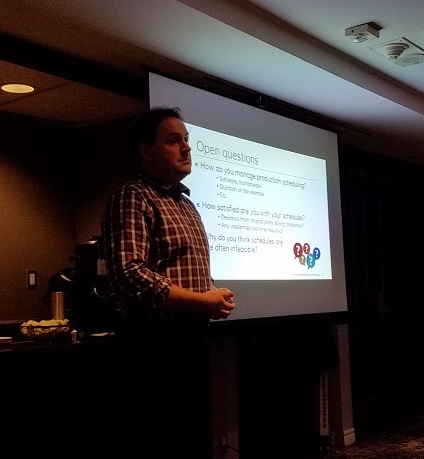 The scheduling process itself hides some waste too: often errors in formulas happens in spreadsheets revised for the 100th time, or errors in calculations or loss of creativity from planners who are too busy to think of better ways to work because it takes so much time to generate a schedule. Once the awareness on waste and scheduling process was established, simulation arrived to the rescue! Simulation is hard bolted with Lean, statistics and programming. We were introduced to Discrete Events Simulation. Events based modeling models systems that change states (example for a machine state: idle, setup, processing, down) at discrete points in time as a result of a specific event. To simulate, you first need to build a model that reflects real life. In addition to a simulation software, for discrete modeling, inputs to the model are: -Design specifications: layouts, routes, dimensions, equipment characteristics, technical data, etc. -Operations knowledge: cycle times, schedules, resources availability, operational constraint, etc. -Historical process data: not averages of the data, but its distribution. Once the model is built, it needs to be validated by experimentation and with feedback from experienced people in the organization. With their input, the model will be optimized to the point that it will reflect more and more accurately your process. Output of the simulation includes performance diagnosis, effective and ultimate throughput, equipment utilization rates, meaningful and custom statistics, trends, pie charts, histograms, in a feasible plan. It is a powerful tool to crunch quickly all the scenarios you want to try and choose the best combination. 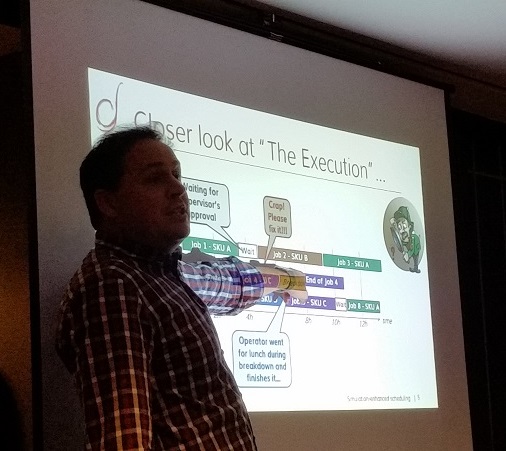 To demonstrate the power of simulation and its benefits, Vincent presented a case of an underground mine construction in Canada. Initially, 3 schedules were made by the mine teams: -Life-of-mine plan -Development plan -Procurement and logistics plan. Even if plans existed, there were still a lot of mysteries and many aspects to consider that each plan individually did not address. Furthermore, there were signs that the project was late and that the 5 year span would not be respected. After the 2 days in the war room with the experts representing the 3 disciplines, the decision making project manager and M. Béchard leading the simulation, they modified several laydown capacities and locations, modified the drift development schedule and swapped logistics sequences. Results were impressive: they caught up the initial delay, reviewed the final plan to complete construction in 5 years and, as a bonus, found a path to make it 9 months earlier. This was a huge project. Smaller projects in other industries (even in health care) could use simulation in their schedules to get benefits and reduce Lean waste. Finally, as Mr. Béchard said: “Even the best simulation will never be able to perfectly and every time encompass subtleties and complexity of real life, but it could for sure save you a lot”. Next time you think about how to improve scheduling, why not look for simulation in your tool box? |
|||||||||||||||||||||
7. Voice Of The Customer
Give me your feedback by e-mail
8. Student Outreach Committee
 By Veronica Marquez, M.Sc., CSSBB, ASQ Senior Member, Student Outreach Committee Chair By Veronica Marquez, M.Sc., CSSBB, ASQ Senior Member, Student Outreach Committee Chair
Finally, March has arrived! The sun has come out and bringing some warmth and it makes me look forward to the spring, with the birds singing and the flowers blooming. 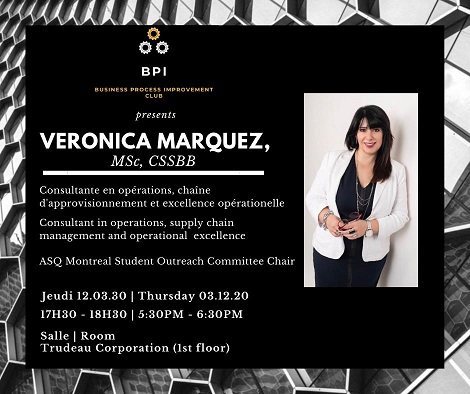 Contactez-moi pour plus de détail: VMarquez@sections.asq.org |
|||||||||||||||||||||
9. Welcome to our New Members
FEBRUARY 2020
Audrey-Anne Bonin Abderrahman Hasnaoui Ali Hassawi Amin Jannatkhah Dhaval Patel Vedant Patel Rajat Taneja |
|||||||||||||||||||||
10. Organization Members
ASQ Montreal Section thanks our Organization Members: |
|||||||||||||||||||||
11. Other ASQ EventsASQ Canada has the following MarchWebEx lunchtime event coming up:
|
|||||||||||||||||||||
12. ASQ News |
|||||||||||||||||||||
13. ASQ Montreal Section Education Program 2020
By Dr. David Tozer, Ph.D., ASQ CQE and SSBB, Education & Audit Chair Having ASQ certification gives you an edge in the market and can significantly increase your income. ASQ Certification often leads to higher paying employment. The money invested in education and certification increases chances of finding employment quickly in the down sizing environment we live in. People who take the section sponsored refresher courses, and spend at least twice as much time as spent in the classroom on self study, have an 80%, or better, chance of passing the examination on the first attempt. Certified Quality Engineer Topics include: quality concepts, cost of quality, human resources, team formation and group dynamics, inspection, metrology, sampling, reliability, quality standards, quality audit, statistics, design of experiments, process improvement, liability, and modern management methods for improving quality. Certified Six Sigma Black Belt Topics include: quality concepts, cost of quality, enterprise wide deployment, business process management, project management, team formation and group dynamics, define, measure, analyze, improve, control, lean enterprise, statistics, design of experiments, and design for six sigma. Certified Six Sigma Green Belt Topics include: quality concepts, cost of quality, enterprise wide deployment, business process management, project management, team formation and group dynamics, define, measure, analyze, improve, control, and statistics. Certified Manager of Quality/Organizational Excellence Topics include: quality concepts, quality planning, customer focus, quality standards, project management, cost of quality, team formation and group dynamics, human resources and improvement. Certified Quality Auditor Topics include: quality concepts, team formation and group dynamics, management responsibility, audit objectives, audit preparation, audit conduct, audit reporting, sampling, and basic statistics.
Certified Quality Inspector Topics include: quality concepts, team formation and group dynamics, geometry, metrology, reading drawings, mechanical processes, statistical process control, inspection, and sampling. Calendar and Registration Form Questions? In house courses, etc.: Dr. David Tozer: (514) 694-2830, education@asqmontreal.qc.ca |
|||||||||||||||||||||
14. Executive Committee Meetings & Officers
Section Executive Committee (Leadership Team) Meetings are held at different locations, starting at 6 PM. The next regular meeting is tentatively scheduled for: April 1, 2020 Consult the List of Your Executive for 2020 here |
|||||||||||||||||||||
15. Unemployed Members DuesUnemployed ASQ members receive a discount on their membership dues based on consecutive years of membership.
Eligibility Criteria
Benefits
NOTE: The following links require that you be logged into your account before you try to activate them. Download the ASQ Unemployment Program Application PDF (105 KB) |
|||||||||||||||||||||
16. Feedback
Please send us your comments about the ASQ Montreal Section 0401 E-Newsletter (topics, layout, length, etc.). Do you want to contribute an article (English or French) or a good idea? Contact us by e-mail. |
|
||||||||||||||||||||
Pass it on
We invite you to forward this Newsletter to friends and colleagues who may be interested. |
|||||||||||||||||||||
|
The ASQ Montreal Section 0401 Newsletter is prepared by and published for its members. How to Opt Out. This e-mail is being sent in the course of normal Montreal Section business to the e-mail address of record. We are not responsible for forwarded e-mails. If you no longer wish to receive e-mail communications from the Montreal Section (your section) of ASQ, please visit your ASQ account to unsubscribe or reply to this message, indicating Opt Out in the e-mail body and in the title. |
|||||||||||||||||||||


